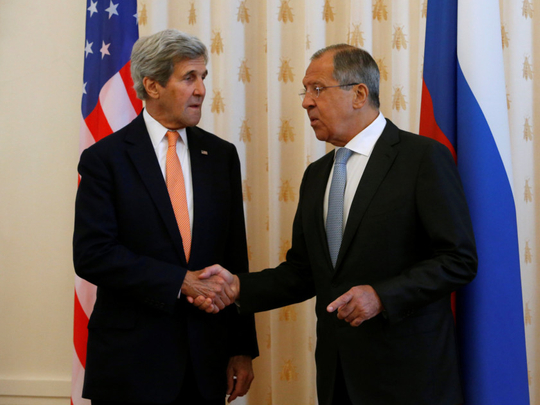
After meeting his Russian counterpart, Sergei Lavrov, in Laos on Tuesday, United States Secretary of State John Kerry stated that he hoped to announce early next month the details of a planned military cooperation and intelligence-sharing with Russia on Syria. The proposals would have the two countries share intelligence to coordinate air strikes against the Al Qaida-affiliated Jabhat Al Nusra. It would also bar the Syrian regime’s air force from targeting areas held by “moderate” rebel groups. Kerry’s comments came just a day after Syrian regime forces succeeded in laying siege to rebel-held districts of Aleppo.
Backed by Lebanese Hezbollah, the Syrian regime launched an offensive to capture a strip of land that brought the vital Castillo Road under control. Seizure of this vantage point gives Syrian President Bashar Al Assad’s forces the ability to cut off the road that links the rebel-held eastern part of Aleppo from Turkey. Forces aligned with the Al Assad regime have also been able to capture the strategically located town of Mallah, just outside the ring road, which encircles Aleppo. The Al Assad regime has hence succeeded in completely bringing Syria’s second largest city under siege.
The regime has so far been very successful in exploiting the frailty of the ceasefire agreed by Washington and Moscow last February and which lacks any mechanism for accountability. Until such time when an understanding between Russia and the US will sideline the Syrian Air Force, Al Assad’s forces and his allies will do their best to force the armed opposition in Aleppo, at least, into total submission. Furthermore, in the event that Russia and the US come to an agreement to coordinate their military effort in Syria, the very existence of the coalition, that forms the armed Syrian opposition, will be called into question, as any deal is likely to target parts of its constituents.
According to a version of the draft agreement that was published by the Washington Post earlier this month, the US proposes the formation of a Joint Implementation Group (Jig) with Russia and seeks to achieve a number of goals. With the Jordanian capital, Amman, as its base, the Jig provides a mechanism for Russian and American forces to synchronise their activities in Syria for the purpose of attacking targets associated with Daesh and Jabhat Al Nusra. Participants in the Jig — the Russian and American militaries — will also work to consolidate the February 27, 2016, Cessation of Hostilities Agreement. The terms of the agreement provide for the suspension of Syrian military activity in areas where the Jig forces are active, but also seek withdrawal of any of the two parties from the Jig in the event that their activities come into conflict with those of the Syrian forces.
While nobody would feel sorry for the elimination of Daesh and other like-minded groups, major flaws nonetheless emerge in the text of this proposal. Most notably, it completely distorts the Syrian conflict, which it conceptualises purely through the prism of combating terrorism. One must always remember that terrorism emerged as a consequence of the Syrian conflict; it was not its cause. Other flaws include a number of loopholes, which provide the Syrian regime with a wide margin of interpretation that would allow it to bomb opposition locations at will. Equally, the proposal lacks any mechanisms to make the regime accountable for its actions in cases where it fails to uphold the terms of the deal. The provision of intelligence-sharing between Washington and Moscow will leave room open for Russia. In fact, the proposal explicitly allows for Russian defence of the Syrian military under certain circumstances.
Furthermore, the proposal completely ignores the role of non-Syrian combatants who have been deployed across the country based on sectarian motives, while simultaneously calling on the pro-opposition regional powers to halt their military support for their Syrian allies. More alarming, perhaps, is the fact that the draft agreement makes absolutely no mention of United Nations Security Council resolution 2254 or any kind of political track that would initiate the long-awaited political transition. This means that the Syrian opposition is being pushed against the wall, in preparation for a final agreement that would end the conflict, but which fails to meet a modicum of the opposition’s demands.
Given the lack of clear guidelines to protect the moderate opposition groups from coordinated air strikes, and the possibility that the Al Assad regime will exploit any deal between Washington and Moscow to carry out its own campaign against the opposition, this proposal could ultimately set the stage for the complete neutralisation of the Syrian cause. The fact that the draft makes no mention of any political transition and given that Russia’s military activities in Syria, in furtherance of its own geopolitical aims, are already under way, the Jig could spell the end of the Syrian opposition.
Marwan Kabalan is a Syrian academic and writer.









